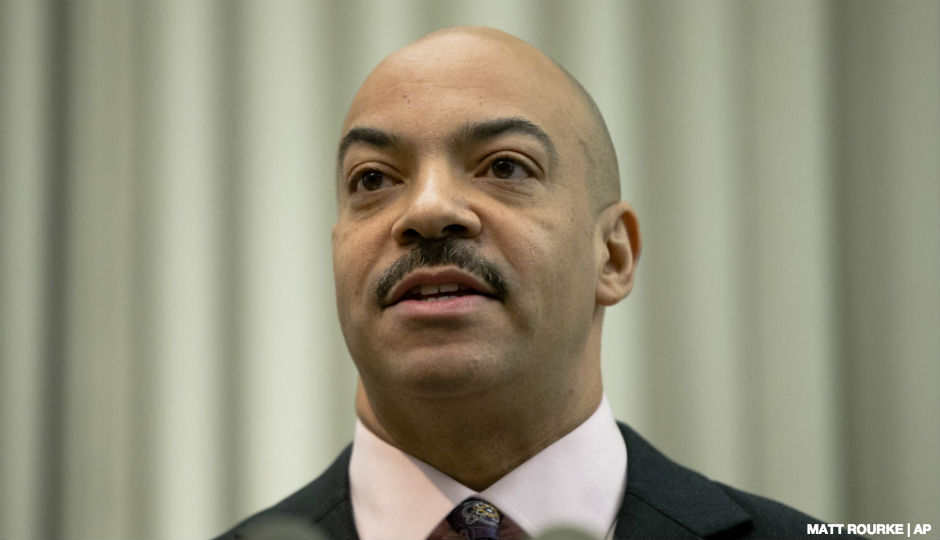A Lesson for Seth Williams in Kathleen Kane’s Abandoned Sting

Let’s give Seth Williams a round of applause.
I’m not being facetious here. Williams’ decision to take Kathleen Kane’s “double-dog dare” last year and pursue charges against Philly Democrats caught on tape accepting cash and gifts has been a triumph on several counts: Politically, he’s come across as a stalwart prosecutor and made Kane look feckless by comparison. His decision has also been a small-but needed-victory over the everyday corruption most of us assume pervades this city’s politics.
But the experience offers a lesson Williams almost certainly doesn’t want to learn.
That lesson? A second set of eyes can be a useful thing. That’s why he should stand aside and let independent investigators do all future reviews when Philadelphia Police use deadly force.
Let’s review: Independent reviews of “police-involved shootings” — an awkward phrase — were a major recommendation of the recent President’s Task Force on 21st Century Policing, which Commissioner Charles Ramsey co-chaired. It’s a recommendation that Williams has politely, but firmly, rejected.
It’s a matter of accountability, he has said:
He tells KYW Newsradio that elected prosecutors, such as him, are more directly responsible and accountable to voters.
“I think there are too many additional problems if we were to create special prosecutors that have no direct accountability to the public,” he said.
It’s also a matter of simply doing the job he was elected to do, he told the Tribune:
“The only aspect of the interim report that gives me pause is calling for the use of special prosecutors to investigate cases of excessive force. That’s the job of elected prosecutors. I am not willing to abdicate my responsibilities as a prosecutor.”
If those responsibilities include strengthening the public’s confidence in this city’s police and prosecutors, though, then he has to step aside in future police shootings. And the Kane case shows why he should.
Public Confidence Matters
Kane’s problem, you’ll recall, was that she failed to prosecute Philly Democrats even though she had hours upon hours of tape recordings in which they clearly took cash and gifts. Her reasons for not prosecuting might’ve been legitimate — “prosecutorial discretion” gives attorneys like her wide berth in making such decisions — but it was easy for critics to suggest she was letting members of her own party off the hook. Often, the appearance of a conflict of interest is as damaging as an actual conflict of interest.
Williams took all her evidence and used his fresh set of eyes (along with the recommendations of an independent grand jury) to bring charges. That decision, in turn, increased public confidence that justice was done in the case that Kane had abandoned. Again: That’s a victory for Williams.
If Kane had an alliance with Democrats, though, the official bond between Williams and Philly police is much tighter. Ninety-nine times out of 100, Williams and police officers will be on the same side. What’s more, we in the public want them to be on the same side. Williams should be the biggest friend and staunchest ally that officers have in this town. The necessary closeness of that relationship, however, means there will always be a question in the public’s mind when it comes time to hold officers accountable.
Think Ferguson, where crowds refused to accept a prosecutor-led grand jury’s decision not to indict Darren Wilson, who shot Michael Brown. Or think closer to home, where the police shooting of Brandon Tate-Brown has already led to a cycle of criticism and recrimination that cannot be resolved just with Williams’ say-so.
Williams has worked hard to defeat perceptions of conflict, both by prosecuting police officers for brutality and old friends for political corruption. So let’s be clear: An independent review of police-involved shootings is a good idea for reasons that have nothing to do with the integrity of Williams or anybody else who might hold the district attorney’s office in the future.
It has been a tough, anguished couple of weeks for the Philadelphia Police Department. They held a funeral for Officer Robert Wilson III on Saturday, a young father cut down cruelly in his prime for no good reason. Williams has stood beside the department the entire time, attending the service, tweeting his condolences, and bringing charges against the punks allegedly responsible for Wilson’s death. Good for him. Along the way, we were reminded, again: Most of our officers are good people doing a dangerous job. Most of our prosecutors are good people putting dangerous criminals away.
Independent reviews of police-involved situations won’t detract from that reality. In fact, they’ll probably build trust by tamping down and even erasing doubts about a prosecutor’s allegiances. That would be good for the community. It would be good for police. And yes, it would even be good for Seth Williams.
Follow @JoelMMathis on Twitter.


